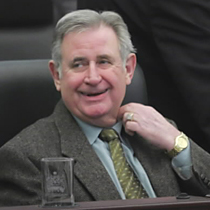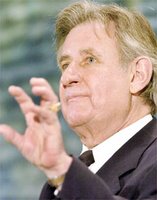By GARY FIELDS

1 of 16
FILE - In this March 1, 1965, photo, the Rev. Martin Luther King Jr. leads a procession behind the casket of Jimmie Lee Jackson during funeral rites at Marion, Ala. From left, John Lewis, the Rev. Ralph Abernathy, King and the Rev. Andrew Young. In 1965, Jackson was fatally shot at a protest in Marion. It was that killing that sent hundreds of people to Selma for a march at the Edmund Pettus Bridge two weeks later. (AP Photo/File)
MARION, Ala. (AP) — Della Simpson Maynor remembers the mounted police officer cracking her elbow with a baton. She recalls the panicked marchers unable to escape the onslaught, and the scuffle between officers and a young church deacon who was trying to protect his mother and grandfather. Most of all, she remembers the gunshot.
Two weeks before Bloody Sunday — the clash in Selma on March 7, 1965, that helped propel passage of the Voting Rights Act of 1965 — there was a march in this small town 30 miles away.
What happened in Marion is now a less-familiar episode in the civil rights movement, a footnote in the textbooks. But the blood spilled here would send hundreds of people from Marion and the surrounding county to Selma and the Edmund Pettus Bridge, where history was made.
“Starting the story in Selma is like reading a book by starting in the middle and not going back to the beginning so you can get the total picture of what actually happened in 1965,” said Perry County Commissioner Alfred Turner Jr. “Without the events occurring in Marion, there’s no way you would have gotten the same results or the optics of Bloody Sunday.”
The protest in Marion was sparked by the arrest of a minister who was leading efforts to register black people to vote. It ended with the fatal shooting of a 26-year-old black church deacon, Jimmie Lee Jackson, by a state trooper.
As the 55th anniversary of Bloody Sunday approaches, people here say they want the full story remembered.

This undated photo provided by the family of Jimmie Lee Jackson shows him. (Courtesy of the Jimmie Lee Jackson Family via AP)
___
The road to Marion, and eventually to Selma, began at the White House months before.
The Rev. Martin Luther King, his lieutenant Andrew Young and other activists sat down with President Lyndon Johnson after passage of the Civil Rights Act of 1964. Johnson “told Dr. King, `I know you need voting rights. I wish I could do it, but I just don’t have the power,’” Young recalled, adding Johnson seemed depressed.
When they left, King said, “We’ve got to figure out how to get the president some power,” according to Young, who would go on to become a congressman, Atlanta mayor and U.N. ambassador. “I said, `That Nobel Prize you won didn’t come with an army.’”
King’s Southern Christian Leadership Conference chose to throw its support behind the Student Non-Violent Coordinating Committee and local groups that had been focusing on voter registration in Alabama, where they were holding protests, sit-ins and boycotts.
The Rev. James Orange of the SCLC organized protests in Marion and Perry County, and hundreds of people were regularly arrested and jailed. When students began skipping school to join the marches, authorities arrested Orange on Feb. 18, 1965, for contributing to the delinquency of minors.

The Rev. James Orange, right, and Obang Metho pray after helping to lay a wreath at the tombs of the Rev. Martin Luther King Jr. and his wife Coretta Scott King at the King Center for non-violent Social Change in Atlanta on Jan. 12, 2007. (AP Photo/John Bazemore)
Former Perry County Circuit Clerk Mary Moore, a second-grader at the time, said the arrest was hypocritical on the part of the white authorities, noting that black students back then often missed school because farmers needed them to pick cotton.
Rumors circulated that Orange would be lynched behind bars. That was by no means a far-fetched fear.
“Black folks in jail ended up dead. That’s the way it was then,” said 83-year-old Elijah Rollins, then owner of one the town’s funeral homes. ”It was just tradition.”
Townspeople planned a night protest march from Zion Methodist Church to the jail on the next block. State and local police were waiting for them outside, where the streetlight was either shot out or turned off. With darkness came chaos.
Rollins had skipped the church meeting but heard the commotion, and when he went outside, “a lot of people were getting the hell beat out of them.”

Elijah Rollins, eye witness to the 1965 death of Jimmie Lee Jackson, recounts the events of that day Jackson was killed in Marion, Ala. (AP Photo/Julie Bennett)
Maynor, then 14, watched as a pastor started off the protest by kneeling to pray, as was customary. Police officers told him to get up and clubbed him when he didn’t, she said. “When I saw that, I was terrified,” she recalled. Seconds later she was hit as she raised her arm to protect her head. An officer on horseback “was whaling down on me.”
“They didn’t know what your age was. They didn’t care. They swung at everybody,” she said.
Somewhere in the melee, Cager Lee, 82, and his daughter Viola Jackson were attacked by police. Lee’s grandson, Jimmie Lee Jackson, came to help them and grappled with officers inside a local hangout, Macks Cafe.
“A few minutes later you heard the gunshot,” Maynor said.
Jackson had a stomach wound and was taken to the black hospital in Selma, where he died eight days later. Rollins, who heard him screaming in pain two days before, picked up the body.
SCLC and local leaders began talking almost immediately about taking his body from Marion to Alabama’s capital, Montgomery, but that idea was abandoned. They decided to lay Jackson to rest at a Marion-area cemetery at a funeral attended by King himself, and later march to the capital from Selma, a more logical staging point.

Demonstrators walk to the courthouse behind the Rev. Martin Luther King Jr. in Montgomery, Ala. The march was to protest treatment of demonstrators by police during an attempted march. At front and center of march in white shirt is Andrew Young. (AP Photo/File)
“We will take this problem to Montgomery and leave it on Wallace’s doorstep,” King told Young, referring to Alabama’s arch-segregationist governor, George Wallace.
Plans were made for the 54-mile march from Selma to Montgomery, but on the day chosen, King was back home in Atlanta, and the federal observers who normally shadowed him and presumably would have served as a deterrent against violence weren’t there when hundreds of marchers with backpacks gathered at the bridge.
State troopers and local police were waiting for them and attacked with clubs and tear gas.
A terrified Terrance Chestnut, 6 at the time, was there with his father, Selma civil rights attorney J.L. Chestnut Jr.
“I saw a cop hit a guy across the jaw with a billy club. I could hear the crack,” he said. “It was a really bad scene, something I don’t care to remember but something I can’t erase from my mind. “
The TV footage and other images from that day shocked the country and helped lead to the landmark federal law protecting the right of African Americans to vote.
The Marion marchers would not recognize the community leadership now.

Retired Alabama state trooper James Bonard Fowler, center, leaves the Perry County Sheriff's Office after turning himself in Marion, Ala., for the shooting death of Jimmie Lee Jackson in 1965. (AP Photo/Rob Carr)
The state trooper who shot Jackson, James Bonard Fowler, was prosecuted decades later by Perry County’s first black district attorney. Fowler pleaded guilty in 2010 to manslaughter and served five months in jail. The mayor, police chief, sheriff and numerous other public officials in Marion and Perry County also are African American.
A marble monument to the civil rights movement has been erected in front of Zion Methodist with the names of the people who participated in those protests. The county jail where Orange was held is closed, but there are plans to turn it into a museum. On the courthouse square is another monument, telling Jackson’s story and adding Marion to the Selma to Montgomery National Historic Trail. It was put up in 2015.
In a letter to the Department of Interior supporting Marion’s inclusion, Rep. Terri Sewell of Alabama cited the role Jackson’s death played in the Selma march, saying that nearly 300 of the more than 500 people who participated on Bloody Sunday were from Marion.
“They paved the way and gave the push to change the world,” said Marion Mayor Dexter Hinton.

Jamida Orange looks around the Perry County Jail cell in Marion, Ala., where her father, the Rev. James Orange, a project coordinator for the Southern Christian Leadership Conference, was held in 1965 after his arrest while organizing a voter registration drive. (AP Photo/Julie Bennett)
In the years afterward, Jackson’s mother “was never right again after Jimmie was killed,” said his cousin Fairest Cureton, 63.
“Jimmie was one of the nicest, most mannerable persons that I knew. He always had a smile on his face,” said another cousin, 76-year-old Julia Cash, “and what was most impressive is he always took time for older people.”
In fact, according to his family, Jackson was too sick to come to the church meeting that night in Marion but drove his grandfather and mother there and was waiting to take them home.
As for Orange, he went on take part in the Bloody Sunday march and spent his life fighting for civil rights and others causes, believing in “this thing called equality,” said his daughter, Jamida Orange. He died in 2008.
“If anybody tells you it was anything but the death of Jimmie Lee Jackson that provoked that Selma-to-Montgomery march,” she said, “they are doing a revisionist history.”

The family of the Rev. James Orange, a project coordinator for the Southern Christian Leadership Conference, pose for a photo outside the Perry County jail in Marion, Ala. (AP Photo/Julie Bennett)
___
Associated Press researchers Rhonda Shafner and Randy Herschaft in New York contributed to this report.
___
Associated Press religion coverage receives support from the Lilly Endowment through the Religion News Foundation. The AP is solely responsible for this content.



